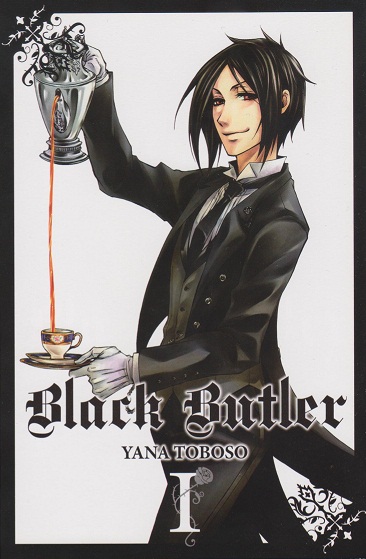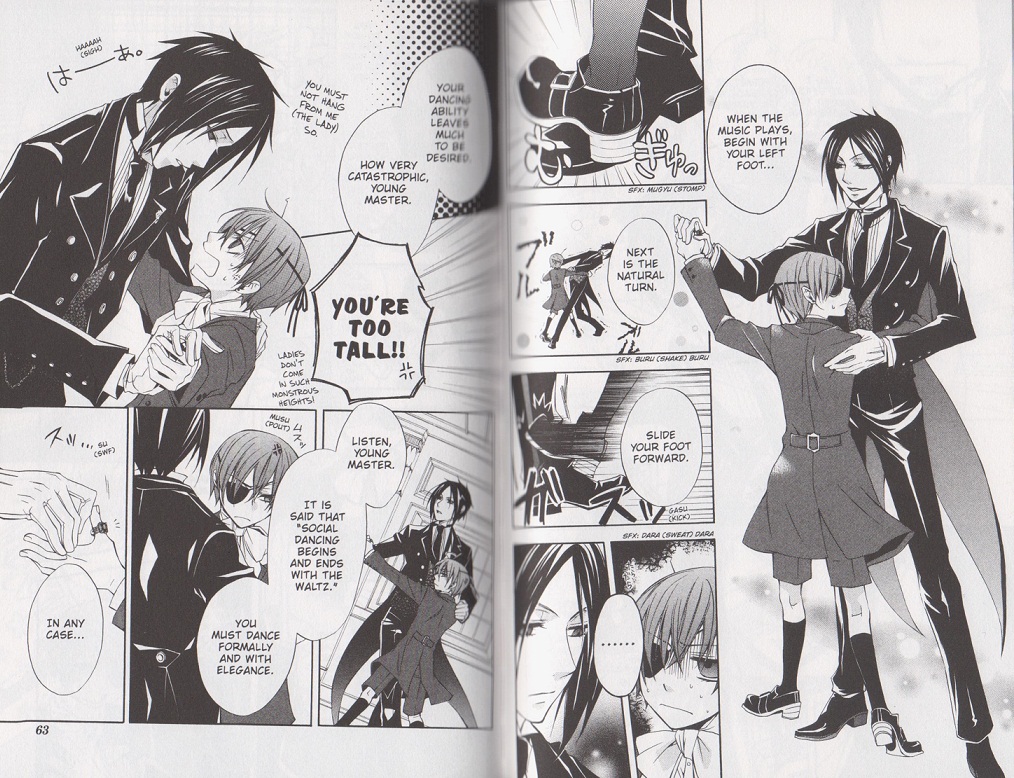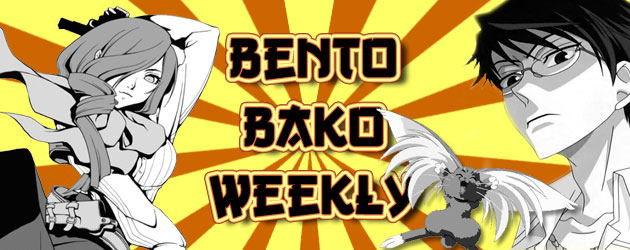 Title: Black Butler (In Japan, Kuroshitsuji)
Title: Black Butler (In Japan, Kuroshitsuji)
Author: Yana Toboso
Publisher: Yen Press
Volume: The first book in an ongoing series (there are currently 8 volumes, and it’s still ongoing in Japan). $10.99.
Vintage: The series started in 2006 in Japan. This first volume was released in January 2010 by Yen Press (and is currently being published in their monthly magazine, Yen +).
Anime: Though this review is strictly for the manga, an anime based on the series ran in Japan during the fall and winter of 2008/2009. It had 24 episodes, and deviated pretty widely from the original source, eventually creating a pretty final conclusion. A second season of the series is slated to air later this year, with new characters.
Genre: Older Teen. Bloody violence, demons and the supernatural, mystery, drama, dark comedy. Sounds great, right? (Hint: The answer is “Yes.”)
The Phantomhive’s are an old English noble family that has always been loyal to the King or (in this Victorian era) Queen. They have served as the royal watchdog (doing dirty work in the underworld) for generations. Ciel Phantomhive is the new head of the family, though he is only 12 years old. Under his guidance, the company his family owns, Funtom, has become the major toy and confectionery manufacturer in England. His parents dead, Ciel runs the household and the business on his own. At his side is his loyal butler Sebastian Michaelis, who also serves as chef and bodyguard. But Sebastian isn’t just any normal butler; he is a “devil of a butler.” To be specific, he IS a devil. During a traumatic event as a child (well, an even younger child), Ciel managed to summon the demon Sebastian, and the two formed a contract together. Sebastian will serve and protect Ciel, in exchange for his soul. There’s a condition to this contract, an unnamed promise, which will be revealed in future volumes.

In this particular volume, we are introduced to Ciel and his household. Ciel is the Earl of Phantomhive, and Sebastian is his loyal butler, but they aren’t the only ones in the manor. There are four other servants in the house, though they do very little actual “serving.” Mostly they destroy everything in sight. The freakishly strong Finnian (Finny) is the gardener, the boisterous Baldroy (Baldo) is the (incredibly untalented) chef, the clumsy Mey-Rin is the maid, and the nearly invisible Tanaka is the house steward. We’re given a glimpse of the day-to-day affairs of the household, and introduced to Ciel’s cousin and fiancee, the bubbly cute Elizabeth. There’s a dinner, a dance, and then Ciel is kidnapped quite suddenly. Then Sebastian gets to do his thing (which translates into bloody mayhem).
For a first volume, I will admit that the book is a little weak. The servants (except Sebastian, obviously) appear to be worthless, and little more than comedic fluff. And the main plot (meaning the reason why Sebastian is even there at all) appears nonexistent, but for a very brief mention of it by Sebastian toward the end of the book (and really, he doesn’t say much of anything). Still, there’s a lot to love – subtle comedy, over-the-top comedy, the relationship between Ciel and Sebastian, excellent action scenes, beautiful art, a smart-mouthed brat, and a classy condescending butler. If you want to know, the servants that appear to have no use at the mansion, are there for very good reason. Sebastian isn’t the sort to put up with that sort of nonsense if he has no use for them, so that should be obvious without me having to reveal anything that comes later.

I had a hard time deciding which images from the book to share, so I ended up going with an introduction to the characters, and one of the funniest scenes in the book (which always gets a giggle out of me). I love how condescending Sebastian can be sometimes. Ciel treats him like a dog. But there’s a sense of mutual understanding in there, and even fondness from time to time. However, Sebastian has just as much pride in himself as a butler and a demon, as Ciel does as a noble, and he won’t suffer any indignities quietly. And while they seem to have a mutual respect for each other at times, there is a sense that Ciel gets his way because he’s entitled to it. It is, after all, his soul that’s going to be devoured in the end. Their relationship is quite interesting and deep, and you’ll see glimpses of that in this volume. Sebastian has an almost comical level of pride in his work as a butler (well, it is comical), and insists on perfection in every way. It’s not easy running a house with the clumsiest, most useless staff, and a very demanding master.
I was so thrilled when this book got licensed. The anime was one of my favorites during the season it came out, but the manga has a stronger central story. If this review got you interested, please pick up a copy. My hope is that good manga sales will convince someone to license the anime as well (it’s actually selling quite well so far). By the way, you’ll notice in my scans that you can see through the paper. When the book is in your hands, it’s not that bad; there’s just a lot of heavy inking and the light from the scanner really makes it stand out. Yen Press did a good job with the book; there’s a lovely color insert in the front, and an excellent glossary in the back.
My only complaints have to do with some of the translation and dialog. Specifically Sebastian’s catchphrase “I’m a devil of a butler.” I’ve seen it translated into “one hell of a butler,” which I think sounds better and makes more sense; but I think YP’s choice of “devil of a butler” is a more literal translation of what he’s saying in Japanese. Personally I prefer the phrasing and the pun of “one hell of a butler,” especially since that is a more common phrasing. I’d also like to know how they went about translating character names. Particularly Baldroy (Baldo? Otherwise he’s Bard/Bardroy.), and Mey-Rin (what’s wrong with Maylene?). Otherwise…the fan girl in me would like “My Lord” to come out of Sebastian’s mouth a little more often.
Next Monday: Millennium Prime Minister volumes 1 and 2.



Is the event that led to him summoning the devil ever explained or is one of those mysteries that lingers through out the series?
Did you want him to say “My Lord” more in an exclamatory sense or as a term of endearment to Ciel?
Whenever I think ‘butler’ I always picture Geoffrey from Fresh Prince, lol.
@IS: Yes, it’s explained. In bits and pieces throughout the series. It might spoil things if I explain. If you want to know (the bare-bones basics) drop me an email.
@Andy:
Well…. He says it quite a bit in the anime. I don’t know that it’s really a term of endearment. It’s almost condescending at times. Or sarcastic. Like, Ciel will give him an order, and in this very classy, almost arrogant way, he’ll say “Yes, My Lord.” Sometimes the meaning is “Sure, whatever you say.” Sometimes it’s a high and mighty, “Oh, but of course.” Sometimes it’s even meant to be respectful.
Now you’ve piqued my interest in the anime, Kris, something that almost never happens! (I’m much more of a manga reader than anime viewer.) I’m with you on the slapstick in the early chapters: it was kind of broad and obvious, but I loved Sebastian’s strategies for fixing the staff errors. I was surprised by how much I enjoyed volume one, considering that this genre isn’t normally my cup of tea (no pun intended)!
The main characters sound very interesting. I think of Mr Belvedere when I hear the term butler. lol
Pingback: Japan Expo awards up; Aurora speculation « MangaBlog
Pingback: Japan Expo awards up; Aurora speculation | Anime Blog Online
Pingback: The Manga Critic » Blog Archive » Hump Day Links, 2/24/10
@Kris-chan: What’s up? Haha, has it been only 7 months since we last discussed the “Kuroshitsuji” anime?
While I haven’t touched the manga, it’s interesting to see you mention how it deviates widely from the anime. The same thing happened with the original “Hellsing” anime because likewise the manga was still ongoing. Difficult to make an “enclosed” anime that faithfully follows the manga, if the manga hasn’t ended. Yet also difficult to wait for the manga, if fans want to see the anime too… Especially since I know you can’t wait to see more “hot devil/butler guys in glasses”, haha.
@Jay-san:
I don’t know what caused the deviation, though that is the usual reason. Unfortunately instead of going back to the original characters and exploring more of the manga (which would require a “Haha, just kidding!” take-back for the ending), they’ll be using totally new characters in the upcoming anime.
“Especially since I know you can’t wait to see more “hot devil/butler guys in glasses”, haha.”
Ah…you know me so well.
Pingback: Bento Bako Lite: March 2010 Previews
I just read this volume, so I am here a bit late… but you know, I thought the language the characters used was quite nice. Maybe because I haven’t experienced it in another form or translation, I’m more ready to accept whatever choice the publisher made. But I do think “devil of a butler” is absolutely perfect—”hell of…” may be more commonly used here in the US, but the “devil of…” phrase reads more like something a Londoner might say (and still keeps the pun intact). It just sounds a little more classy to me, and Sebastian always seems so careful with his diction.
Thanks for bringing up the issues you had with translation! I’m always interested in what other readers think of that. I thought Yen did a great job with giving many of the characters individual “voices” and not all speaking in the same manner, something especially important in a series like this with characters from many different social positions.
“but the “devil of…” phrase reads more like something a Londoner might say (and still keeps the pun intact). ”
You know what…that didn’t even cross my mind. That it might be a more “British” phrasing.
And thanks for stopping by! Better late than never. 🙂
Pingback: Bento Bako Lite: Black Butler 2, Time and Again 1